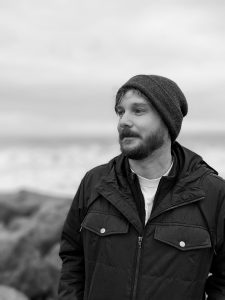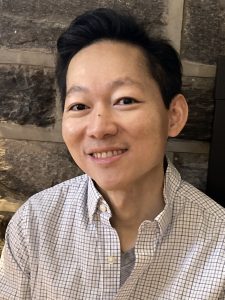
My grandmother fancied herself a glamorous woman, an old-fashioned movie star, but in fact she weighed seventy-nine pounds and had ropes of veins running up her arms. She rarely changed out of her front-zip housecoat with crumpled, used tissues in one pocket and a pack of Pall Malls in the other. Her hearing aid squealed on and off as she neared various electric household appliances and she’d grimace as she screwed her fingers into her ear to shift the broadcast channel.
The vestigial efforts she made at grooming were rudimentary. Each day she brushed her teeth with Comet cleanser to scour the tea stains and cigarette tar off of her teeth. She wore shiny gold bedroom slippers that slapped her cracked heels when she walked like flip-flops, and she tucked the badly dyed wisps of her hair under a crooked wig. Her fingernails, though thick and ridged, were always neatly painted. By me.
I loved her.
My grandmother had terminal pancreatic cancer and was taking longer to die than the doctors had expected. Every day after school and on weekend nights I got to stay with her to make sure she drank her prescribed Brompton’s Mixture and no more. Brompton’s Mixture was a combination of potable morphine, cocaine, whiskey, and honey, invented at the Royal Brompton Hospital in London for the most ill of patients. I had a key to the fridge where it was kept in Dixie cups, and I knew it was important that I kept the key on a string around my neck. I did not know that she had become a morphine addict.
She and I slept in her room in two twin beds, her close to the hallway, and I in the bed by the window. I was a light sleeper, so I woke when she roused to have a cigarette or to walk the house in the night. By the time she switched on the bedside table light, grabbed her Pall Malls, smacked the pack against her palm, placed a cigarette between her dried lips and flicked open the metal lighter lid, I was sitting up.
“Go back to bed,” she said, her voice dusky.
“I’m up anyway.”
“You’re too young. Go back to bed.” She pulled the flame to the tip of her cigarette, illuminating her face while she drew a deep breath.
“You shouldn’t smoke in bed,” I said, sitting across from her, our pale knees touching in the narrow aisle. She finished her inhale and held it for a moment, then blew it forcefully to the side, away from me.
“I know.” Then leveling her gaze, “Don’t you ever let me catch you smoking.”
We had our most peaceful conversations in the middle of the night while she smoked, nylon nightgown hanging off of her bony shoulders, heels tucked up under her.
“You know, I would have slept with Jack Kennedy if he had asked me.”
“Who is Jack Kennedy?” I asked, lying down because she made me.
“Oh, for goodness sake! What do they teach you in school?” Tap, tap, the ash dropped into the glass ashtray.
“Nothing about a guy called Jack. Who was he?”
“The president who put the man on the moon. Honestly.”
“That was John Kennedy,” I said, emphasis on the John.
“Not to me, he wasn’t.” And then as if to herself, “Not to me.”
On some nights, I could get her to tell me a story.
“Tell me the story about the Green Dress.”
“I don’t want to tell that story.”
“Tell it.”
“I’ve told you that a million times.”
“Tell me again.”
“Well.” A pause. A gathering. “My mother. Your Great Grandma Crick. She was a cruel woman. She made me work in the bakery from four in the morning until four in the afternoon when I was a young girl. Younger than you. And she made me sell eggs in the street like we were poor. And we weren’t poor. And the boys would tease me and chase me, so I ran.”
She crushed her cigarette, turned out the light and lay down on her side facing me, sliding her hands between her knees.
“Then what happened?” My whisper seemed loud in the stillness of the dark.
“I could run. You know, like you can run, like the wind. And I could dance. All the boys wanted to dance with me. So one Saturday, there was going to be the big dance. I kept some of the money I’d earned from the bakery and bought a green dress. Made with a bodice. You know. And silk. So I laid it out on my bed that morning before I went to the bakery.” I could hear her breathe. Slow and even. Her small body looked like a child’s in the dark. “When I came home, Great Grandma Crick had taken scissors and cut my dress into a million pieces.”
“Did you go? To the dance?” I knew the answer.
“I’ll tell you where I went,” she said. “I went over to Aunt Rhoda’s house and lived with her.” She sighed and rolled on her back. “Aunt Rhoda didn’t cut up people’s dresses.”
We had some of our most expansive silences as she sat up in bed, left hand pressed into the mattress to support her, right hand holding her cigarette. I listened for the little bah sound of her lips letting go of the filter, the weighty pause as she held onto the smoke, and the long fffff of her exhale. Sometimes she stalled, gazing softly into the distance while her ash grew longer and longer, finally dropping unnoticed onto the carpet.
One night the pain struck violently. I was sleeping and I heard her yelling. “Oh-oh!” She was in her bed in a ball on her side. She yelled, “Oh!” Both arms, crossed over her belly, knees up to her nose. She rocked and yelled.
“Nana!”
“Oh! Oh!”
“What’s wrong?” I leaned over her in the dark. She flailed her arms like a blind woman, hitting me in the side of the face. I ducked and put my hand on her side to reassure. She grabbed my fingers, grinding bone on bone. Though tiny, she was strong, made of piano wire and gristle. “I am here,” I whispered. Her eyes were wild and unfocused. She shook her head back and forth. I said, “My hand,” and she let go and rolled onto her side, groaning.
After enough time had passed that I thought she had fallen back to sleep, she got up and ran, doubled over. I chased her down the three quick steps into the sunken living room and hugged her to the floor.
“I can’t hear!” she shouted. “Get me my hearing aid! Get me my hearing aid!!!!”
I told her, “There’s nothing to hear.”
“Get me my hearing aid,” she yelled, so I ran to her bedside, yanked the drawer, snatched the hearing aid and ran back.
She put it in. It whined. She jammed it deeper. I shouted, “Let me do it,” and grabbed her wrist, forcing her arm away from her ear. We stayed like that, a stalemate, an accidental arm wrestle until I felt the fear and strength drain from her and found myself holding her limp arm aloft, the loose skin gathered around my too firm grasp, her pulse pounding louder beneath my clenched fingertips. I softened my grip and guided her hand to her lap. “I’m going to take it out and fix it,” I told her, breathless, and she turned her face slowly, as though watching a distant bird fly along the horizon, and I realized she was offering me her ear. I removed the flesh-colored aid and flicked the miniature button to off. “There.” I replaced it. “Better?” She nodded, pushing it deeper with her fingers. Breathing heavily, I hugged her to me, pressing my forehead into hers.
I had been staying at my grandparents’ home my whole life. My parents had had four children born close together, boom boom boom boom, so my grandparents had moved up the street to help out while my father put himself through night school. On the weekends, my older brother Drew and I went over to my grandparents’ house so my mother could focus on the babies. My grandfather, Da, was alive back then, walking around in a pressed white T-shirt, grey Sears trousers with the permanent seam down each leg, and a worn leather belt. He was a fix-it man when he wasn’t working at the Mill, so he and Drew built and dismantled things with tools while I spent my time with Nana.
My grandmother was bewitching back then, thin when other people’s grandmothers were heavy, modern when other grandmothers were dowdy. She decorated her house in gold-painted furniture and dressed up every day. In her bedroom bureau, she had a drawer exclusively for belts and another exclusively for scarves. Her foot was a size five, which, according to her, was a sign of a delicate and glamorous nature, so her closet held little high-heeled shoes I outgrew in third grade.
I didn’t care that she rarely left the house except for bowling night, or that she only had an eighth-grade education and didn’t like to read. All I knew was this: When she asked me what made me happy, I would tell her lots of presents on birthdays and Christmas. When I asked her what made her happy, she would say, “I’m happy when you’re happy,” and I knew it, in my young heart, to be the truth.
The living room clock in my grandmother’s house was imitation gilded gold and rococo, consistent with her fancy but inexpensive taste. At night, the outside light from the lamppost illuminated the clock face through the large picture window. On the bad nights, the clock reminded us how long we had to wait until her next dose.
“Well?” my grandmother asked once she stopped worrying her hearing aid.
“An hour and twenty minutes,” I told her as we collected ourselves from the living room floor. We moved the short distance to the lounge chair that faced the window. I had inherited her narrow hips so we could sit, side by side, between the cushioned arms.
She reached for her cigarettes and slid the lighter out of the cellophane wrapper. Her lower leg bounced nervously.
“Are you cold?” I asked. “Do you need your house coat?” She flicked the lighter and leaned toward the flame.
“No,” she said out of the corner of her mouth. A car drove by under the streetlight outside and we both watched its red tail-lights disappear around the curve. “You know,” she said, snapping her lighter shut, “I wanted you to be the flower girl in Debbie’s wedding.” She dropped her head to the palm of her free hand and began to weep. “Aunt Ida told me you would be the flower girl.” Aunt Ida was not my aunt and Debbie was not my cousin, but we always referred to them that way. Debbie had gotten married nine years earlier. “She told me you would be. She said you would be the flower girl.”
“But Nana, you know I never wanted to.” I stroked her bony back, trying to rub the ancient regret away.
“Don’t be silly, every girl wants to be a flower girl.” She looked at me with watery eyes.
“Not me,” I said. “Flower girls have to wear dresses,” and she registered the truth, at least for that moment, and looked down. Digging under her seat cushion, she pulled out some old, crumpled tissues and wiped her eyes.
“You always were such a tomboy,” she said, blowing her nose. “You know your mother had to write to the school about that.”
“I know.”
“They didn’t like that you wouldn’t wear the dresses, but your mother said, ‘You’re either going to let her wear the pants, or you’re going to see her underwear because she’s always upside down.’” She elbowed me and smiled through her tears. “On the monkey bars. You know.” She chuckled to herself and looked out the window. “I wonder what they thought of that note. Stupid men.”
The living room clock ticked loudly. I glanced at it.
After a while, she looked down at her diamond rings, heavy, swinging around her bony fingers. “You know these were Great Grandma Crick’s.” She twisted one off and handed it to me. “They bought this one in Atlantic City. Did I ever tell you that?”
“No,” I said, but I had heard it as well.
“This was the one she got after he beat her up. Black and blue. He took her to Atlantic City to make it up to her and bought a cheap diamond ring. And she took it.” I tried it on for a moment and felt its uncomfortable heft, then handed it back, placing it in her warm palm. “That’s right. Don’t let it touch your skin. It might burn you.”
I smiled. She took a drag on her cigarette. “Horrible woman.”
We both looked at the ticking clock.
Over the next forty-five minutes I watched my grandmother slowly deflate. Though she had been leaning on me before, I could feel her weight, heavy now, begin to sag and it became an effort to hold myself upright. Her shoulder jabbed into my ribs and her head rested on my upper arm. Her fingers hung so loose around her cigarette I worried the butt would drop onto the floor. My grandmother, wrestling just an hour before, became limp, boneless. Sleeping, but not. A glistening strand of saliva stretched from her lower lip to her lap and I snapped it with my finger.
“Let’s go to bed,” I said, kissing her forehead and working my way to face her. Heaving her up, I tucked my arm under her knees and lifted. She drooped and slid, light for a person but heavy for her size, her dead weight folding her in half. I had to stop twice on the short trip to bolster her with my thigh.
She poured off me as I lay her down, immediately curling into a ball, a pill bug. After covering her with the bedspread, I set my digital watch alarm for 6:30 a.m., her next dose, and lay on my side, facing her. I slid my hands between my knees and watched as her back rose and fell, rose and fell, rose and fell.
“Toast?” I asked her, as she padded into the kitchen only twenty minutes after her Brompton’s, ready for the day in her housecoat, her lips red with lipstick and her wig on straight. I grabbed the bread out of the breadbox and put two slices of Wonder into the toaster.
“Thank you,” she said, leaning to the side to reach for her Pall Malls. She sat in one of the two chrome chairs around the little table. “Did you sleep well?” she asked.
“I did. Did you?” The casual morning banter.
“Yes,” she explained with a cigarette pinched in one corner of her mouth while she fished in her other pocket for her lighter.
The toast popped and the acrid smell of blackened bread filled the air. I took the stick of butter from the large refrigerator and cut off a chunk. I never liked the buttering of my grandmother’s toast: pressing cold, hard butter onto crumbling burnt toast.
“What are you going to do today?” she asked as I placed the toast in front of her.
“Hang out with you.”
“Oh, honey. Don’t waste your time,” she said, “What about a boyfriend?”
“Uch,” I grunted, getting my Cheerios and bowl out of the cupboard.
“Don’t ‘uch’ me. You’re a beautiful girl. It’s the only thing I ever wanted; to live to see you married.” I turned on her. She waved me away before I could get started. “It’s wonderful to fall in love. You deserve that in your life.” She looked off to the side and sucked on her cigarette, drawing in her cheeks and filling her lungs with smoke to make her point.
The kettle whistled and I filled her teacup, adding a Lipton tea bag and watching the tannin-colored smoke bleed into the water.
“Dad tells me Great Grandpa Crick was no better than Great Grandma Crick.”
“He was a drunk,” she conceded, placing her cigarette in the ashtray between us. A single plume of white smoke rose straight up then swirled in an invisible air current. “But he wasn’t cruel like she was. Your Great Grandma Crick, she was a jealous woman. If your grandfather hadn’t come along to take me away, I’d probably still be scrubbing pots in the bakery basement.”
“Because you were beautiful.”
“Because I was beautiful,” she agreed. Old Great Grandma Crick with her bulbous hernia from a lifetime of lifting copper pots, knuckles the size of horse chestnuts and lower eyelids that peeled away from her eyeballs to reveal their pink interior in a way that made me feel as though I were looking at someone’s insides. She was so ugly. No wonder there was strife.
“Dad says Great Grandma Crick chased Great Grandpa Crick around the dining room table with a butcher knife,” I announced, angling for some information about family lore I’d heard at home.
“It was a paring knife,” she confirmed, carefully pulling her red lips away from her teeth to take a bite of toast. “But he’s right. She did.”
“No way.”
“It’s true.” She set her toast down.
“But why?” I had been certain the knife story was myth.
“He was an embarrassment,” she said, as though this were obvious. “After he’d get the early morning baking done, he’d go to the bar and get himself drunk. Then he’d stagger up the street from pole to pole in the middle of the day. She didn’t like that.” She zigzagged her hand back and forth, pole-to-pole, pole-to-pole.
“I don’t think I’d like that either,” I said, tipping my bowl to my mouth to drink the milk.
“Oh, she didn’t care that he was drunk.” She flashed disapproval; Nana wasn’t one for bad table manners. “She just didn’t like that he did it out in the open in the middle of the day. Great Grandma Crick said it didn’t look good. She said people would buy their bread from someone whose husband didn’t stagger up the street in broad daylight. She always worried about appearances. She always worried about the money.”
“I remember her and her money,” I said, standing. “She had a penny jar in her kitchen cabinet behind the doily drapes. Whenever we went to visit, she would show it to me and say, ‘I’m saving all this for you. It’s our little secret.’”
“Well?” Nana smirked.
“Well what?” I asked.
“Did she ever give it to you?”
“No.”
“There you go,” she said as she stood, stubbing out a perfectly good cigarette.
We sat. We talked. We laughed without a care or a glance to the Brompton’s fridge. After a while, though, she became fatigued and walked to her room, stooped and holding her arm in front of her abdomen as though protecting it. I followed.
There, I helped her remove her housecoat and sat her on the bed. She paused to catch her breath, then lay down on her side. I gently pulled her wig from her head, careful not to pull her hair, and set it on the skull-shaped Styrofoam stand on her dresser, stabbing a single straight pin through the top to keep it in place. I filled her water glass and placed her cigarettes on the night table. Because it was time, I walked back in the kitchen and removed the string from around my neck, careful not to catch the key in my hair.
The smell was overwhelming to me when I opened the refrigerator. Brompton’s mixture was musky, strongly alcoholic, viscous, and dark amber in color. The Dixie cups in which each dose was kept had softened a bit where the liquid had been, as if the contents had been eating away at the internal structure.
I gently grabbed a single cup and closed the door, locking it. I walked carefully to Nana’s room, holding the cup out in front of me, as though it was precious and toxic, because it was. When I got to her room, she was cramped up, eyes closed and moaning quietly. I sat on the edge of her bed and placed my hand on her shoulder. Her flesh was loose on her bones, warm and familiar.
“I have it,” I said. She opened her eyes slightly and began to push herself up. I put the cup on the night table.
“Let me help you,” I said as I reached around her to pull her up to sitting.
“Oh, honey,” she apologized, forehead on my shoulder to prop herself.
“Shhh.”
I took the cup and held it out to her. She steadied herself on the edge of the bed and then reached.
She tossed it back quickly both because it was vile and because she had learned that it would bring her relief within minutes. My grandmother, who casually chewed Excedrin, shuddered with revulsion at its unmatched bitterness. She crushed the cup and kept it in her hand as she lay back down, her nightgown twisting around her as she rolled to face away from me.
“Want some water?” I suggested. “It won’t be so nasty.” She waved it away with the slightest gesture of her hand, so I sat and rubbed her back in circles, waiting quietly for the medicine to numb her body.
Over a period of twenty minutes, she unfurled so slowly that you might not have noticed it if you stared only at her. But if you looked away for a while, then looked back, you would see that eventually she lay on her back, ringed hand resting gently on her stomach. I waited until she was still for quite some time before reaching across her for the crumpled Dixie cup that had fallen from her hand onto the mattress. I dropped it into the plastic wastebasket filled with tissues and crushed cups. I tidied her covers and switched off the light.
I bent to kiss her soft, lined forehead, moments earlier so furrowed in pain, and smelled a rotting whiff of the Brompton’s on her breath. I grabbed her free hand and kissed the back of it, then rubbed my own kiss off. Her nails looked good. I was getting better at the polishing. Her eyes opened just a bit.
“Hey,” I said. She smiled ever so slightly at me, but she was no longer very present.
“I’ll be back in a bit. Go to sleep now.” Her eyes began to fill with water. I reached across and took a fresh tissue from the box.
“You’re good now,” I said, dabbing. She reached up and grabbed my arm, squeezing me toward her with a strength I could not believe.
“I love you most of all,” she mouthed.
“I love you most of all,” I said, and watched her eyes slowly close.
And I waited with her there, until her grip loosened completely.
Kathy Smith grew up in Swarthmore, Pennsylvania and earned B.S. in economics at the University of Pennsylvania. She went on to earn an MBA from University of California at Berkeley. Though she still dabbles in finance, her greatest joy is being a mom of three, followed by writing. Her work has appeared in Apiary, and she has won two honorable mention awards from Glimmer Train. She resides in Bryn Mawr with her beloved husband and snoring bulldogs.









